Early instances of 'mother's ruin' as 'gin' not previously noted
Several early instances of "mother's ruin" as a slang term for "gin" have not been noted in previous answers.
First, from Charlotte Cameron, A Woman's Winter in Africa: A 26,000 Mile Journey (London, 1913):
I stare in fascinated horror. He [the steersman] passes it [a bottle of gin] on to the man beside him who is holding the sail rope ; he in turn glues his mouth to the bottle. Then the steersman takes it, and passes it to me, saying, "Mummie have—it live for good," in pidgin-English. I am glad I am born with a sense of humour. It drowned my fear, and I laughed heartily. ... The gin ("mother's ruin") I declined!
From the Birmingham [England] Daily Post (June 2, 1914) [combined snippets]:
might have been expected for Bank Holiday crowd—thoroughly enjoyed the familiar products thereof. The third which he gave (garbed this time as a middle-aged woman) was in praise of that colourless fluid which by acquired the reputation of being mother’s ruin.” It is not new, but helped out [by] suitable patter delivered in accent reminiscent of homely Lancashire, it pleased as it has pleased many times before. The other items in the programme possess both merit and variety.
From the Dundee [Scotland] People's Journal (September 26, 1914) [combined snippets]:
"Ain't got a drop of three star special, I suppose." The woman grinned. "I don't nip to brandy in Pegler's Court. A half-quartern of mother’s ruin sometimes comes this way. I've got it. There's a girl on the top floor who sometimes keeps drop of brandy."
Friom Guy Thorne, The Secret Sea-Plane (London, 1915), an instance that Hugo's answer mentions, but without providing the relevant quotation in full:
"Mrs. Potmouth was generally a bit up the pole by two o'clock in the afternoon. 'Er failing is gin. She could lap up 'mother's ruin' like a canary. One of the gals, Alice, used to slip into Yarmouth till the old lady woke up about six, and began to get Lieutenant Lodz's dinner ready. ..."
From Douglas Goldring, Polly (London, 1917):
Polly's baby was born in due course, and christened Eleanor Sophy Jane. The circumstances surrounding its birth were known only to Polly, to Mrs. Watson, and to an elderly "monthly" called Mrs. Baggot who, in the lucid moments allowed her by an undue addiction to drops of mother's ruin, declared it "a shame."
From "A Wild Wedding: Matrimony and Melee at Mortlake," in the [Melbourne, Victoria] Truth (January 5, 1918):
Presumably the dears regaled themselves with coffee and ginger beer, but in the light of subsequent events it certainly would have been better had they helped consume the stronger tuck, for then there would have been less to go to the heads of the celebrating males. It would be a pretty safe bet, however, that there was A DROP OF MOTHER'S RUIN floating around somewhere for tho old dames who felt a little run down after the day's excitement.
And from the Lanarkshire [Scotland] Daily Record (April 16, 1918) [combined snippets]:
Stern necessity is doing what nothing else could have done. [It] is performing the gigantic, miraculous feat [of] transforming the British housewife into a cook—not an Eliza Jane Bridget Ann, addicted [to] mother's ruin and fat policemen admirers, but [a] cook [of] gumption and artistic sense and selectiveness.
Also of possible relevance is this slightly later instance, from the Hull [England] Daily Mail (August 16, 1921):
A man who admitted to the Ealing magistrates that he had 'had a drop too much Lizzie' was explained to have been drinking gin. —It is interesting to note that gin has been called a variety [of] names—notably mother's ruin and white satin.
One can only wonder whether the Moody Blues were aware of that meaning of "white satin."
How did 'mother's ruin' become a slang term for 'gin'?
In order for a phrase to pass from an anathema thundered by prohibitionists to ironic slang used by imbibers of the offending substance, the phrase must first become a rhetorical staple and then gradually come to be viewed as a ludicrous overstatement. "Mother's ruin" seems to have passed through this social process. A similar fate seems to have befallen the earlier "demon rum": the spirit's enemies originally concocted the expression as the fiercest denunciation they could imagine, but eventually people came to say it almost exclusively in jest.
Use of "mother's ruin" to characterize the consequences of imbibing wine and spirits can be found in British temperance literature by the early 1880s. The following example, From Ellen Ross, "From Want of Thought," in the [Swansea, Wales] Cambrian (January 7, 1881) gives a sense of the sort of heartrending stories that temperance enthusiasts purveyed in the cause of alcohol prohibition:
About two years previously John Cuthbert [a grocer] had availed himself of the privilege held out to grocers of obtaining a license for the sale of wine and spirits; and now in his Christmas display these viands featured most prominently. ...
...
Having finished her survey of the shop, Mrs, Cuthbert was about to return to her kitchen, when her eye fell upon a young servant girl, who was one of the few customers in the shop. One of the assistants had just placed before her a bottle of gin and a bottle of brandy, which she was transferring to a bag which she carried under her shawl.
...''>"I'm very sorry," said Mrs. Cuthbert, with heartfelt concern. "The home must be very wretched, Susan. But does Mrs. Stevens really drink much?"
"Why, that dreadful, ma'am, that you'll see whether she won't be sending me here again either to-morrow or net day."
"And will she have drunk those two bottles of wine?"
"Not wine, ma'am, but spirits, and very soon they'll be finished, I can assure you. It's dreadful to see her carry on sometimes, just like a raving mad-woman, and the dear children are frightened to death at her. ..."
Mrs. Cuthbert is soon called away to attend her sister, Mrs. Lyon, in Hampshire, who is suffering from delirium tremens as a result of alcohol addiction. Her niece Alice tells her that Mrs. Lyon fell into the clutches of addiction because her neighborhood grocer had begun selling wine and spirits:
"But how did she get it?" asked Mrs. Cuthbert. "Did your father allow her to have large quantities in the house?"
"No, aunt. At first nothing extra came into the house. But she used to go out and get glass after glass of wine at the different confectioners' shops. Then, worst of all, our grocer that we have dealt with for years must needs go and transfer himself into a publican, to tempt his customers. He took out a license, and sent out his wine and spirit circulars round the town. This is what I consider completed poor mama's ruin. She would hesitate to send to a public-house day after day fo the dreadful stuff ; but she had no hesitation whatever in ordering any amount from her respectable grocer. ..."
Mrs. Cuthbert confesses that her husband has taken out a license to sell wine and spirits at his grocery, and that one of his customers (Mrs. Stevens) was now in a very bad way owing to drink.
"And do you think that one is the only one?" asked Alice. "And even if it were, is not one enough to have ruined?" Isn't it enough for our grocer to know that he has been the means of completing poor mother's ruin, and spoiling for ever the happiness of our home? Surely one is enough. Oh dear! how ever could good uncle John find in his heart to turn drink-seller!"
Conclusion
I found and confirmed one instance of "mother's ruin" as slang for gin from 1913, two from 1914, one (previously cited by Hugo) from 1915, one additional instance from 1917, and two additional instances from 1918. The sources of these seven instances are England (four of the seven, including the two earliest), Scotland (two), and Australia (one).
However, the association of a "mother's ruin" with alcoholic drink—both wine and (especially) higher-proof spirits such as gin and brandy—began considerably earlier, appearing in temperance literature by the early 1880s.

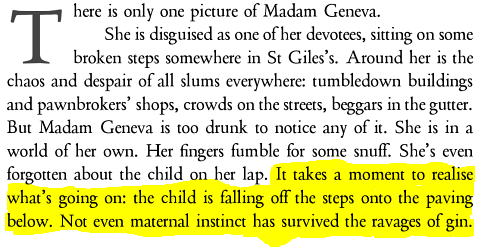
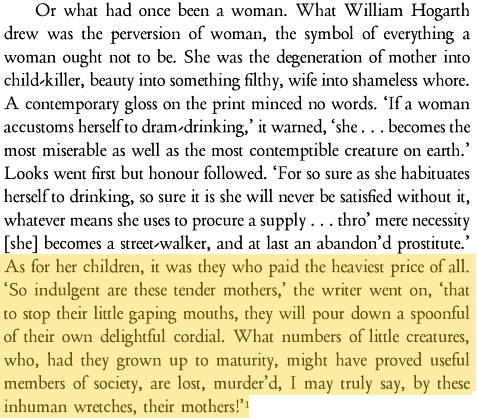
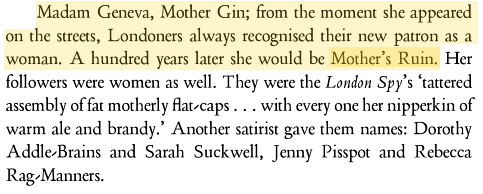
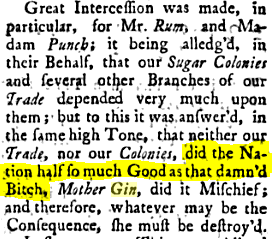
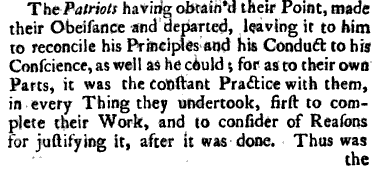
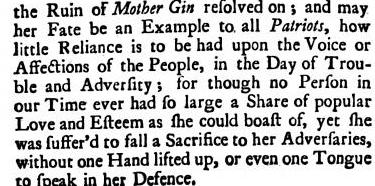

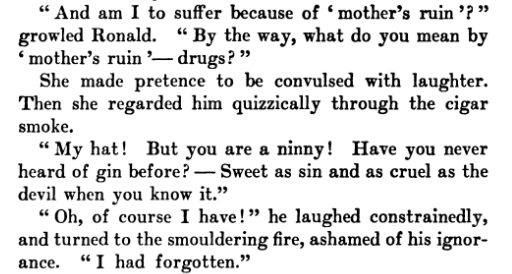
![DR. HANWELL You ought to send him away. " VELVET " Oh! Oh! There goes me 'eart! [Moistens her lips.] Would y' mind if I took a little? DR. HANWELL A little what? " VELVET " " Velvet/' dear — doctor. " Mother's ruin," they ...](https://i.sstatic.net/n4oHp.png)